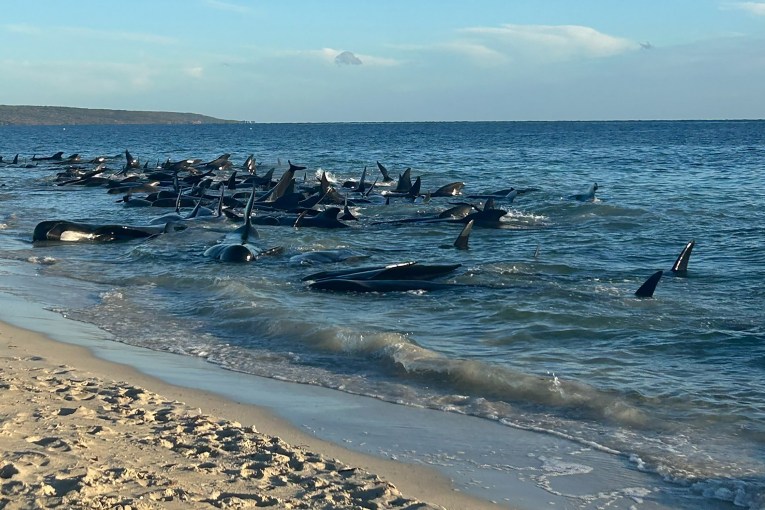Government unable to confirm net-zero cost as Scott Morrison faces tense COP26


Energy Minister Angus Taylor told Insiders he was unable to put a cost on his government's net-zero plan. Photo: ABC
Energy Minister Angus Taylor says he is unable to provide the exact cost of the government’s net-zero plan, saying he couldn’t “commit for other governments” into the future.
It comes as he and Prime Minister Scott Morrison brace for a potentially bumpy time at Glasgow’s COP26 climate summit, following calls from British Prime Minister Boris Johnson to take swifter action on coal and electric vehicles.
Mr Morrison finally committed the federal government to a formal net zero by 2050 goal last week, two days before leaving for the G20 and COP26 in Europe, but the public is still no clearer on the costs of the plan or its exact pathway.
The government has refused to release the modelling on the plan, with Mr Morrison only committing to its release within “weeks”, while the federal Treasury department told Senate estimates last week it played only a small part in formulating that modelling.
On Sunday, Mr Taylor appeared on the ABC’s Insiders program, where he repeatedly skirted questions on the costs of the plan.
Mr Taylor would only say Australia had committed $20 billion in research and development into green technology over the next decade, refusing to detail any further financial impacts.
“Future governments will allocate as they see fit in the 2030s and 2040s. I’m not going to commit for [future] governments,” Mr Taylor said from Rome, where he is attending the G20 summit.
“Future governments will do what they see appropriate to get to these targets.”
Tweet from @InsidersABC
He added that he expected the “run rate” of that $20 billion over the next 10 years was “what we would expect into the future”, before then saying he didn’t necessarily expect that same amount to be invested each decade.
At the same time, acting PM and Nationals leader Barnaby Joyce was on Sky News.
He revealed the Nationals had secured a regional transition fund as part of their support for net zero, but also wouldn’t reveal what it would cost.
“[Regional areas] need a fund that actually inspires the new businesses that will employ people to start up, if what the globe is saying is going to happen,” Mr Joyce said.
Labor’s Chris Bowen was scathing of Mr Taylor’s responses.
“Angus Taylor’s plan is to do not very much by 2030 and leave it to future governments to do the rest,” he said.
“The government, which engaged in all sorts of scare campaigns in the past about the cost of Labor’s policy, is not able to release the modelling of their own and not able to answer basic questions about their own policy.”
Mr Taylor said “governments don’t commit beyond the next decade”.
But as Insiders guest and Nine newspapers journalist Peter Hartcher noted after the interview, governments routinely commit to multi-decade projects in areas like defence, including the nuclear submarines plan, which won’t see its first boat in the water until 2040.

The government’s pathway to net zero by 2050.
The federal government has received significant criticism from environmental groups, tech experts and the Labor opposition over its net-zero plan, which assumes that 15 per cent of Australia’s emissions reduction will come from as-yet-unproven technological advances.
Mr Taylor repeatedly said he expected government investment in technology to boost productivity, encourage businesses to change their practices once the technologies become cost effective, and cut emissions.
He also ruled out taking a stronger 2030 emissions cut to the Glasgow summit.
Despite climate scientists warning stronger short-term targets were crucial to stave off irreversible climate change, and despite COP26 being about 2030 goals not 2050, Mr Taylor said the government needs “to keep faith” with voters who had rejected stronger emissions cuts at the last election.
“This is our policy. We’ve got absolutely no plan to change it, none whatsoever,” he said.
It potentially puts the Australian delegation on an awkward collision course with their host Mr Johnson – a good friend of Mr Morrison’s – who has explicitly talked up the need for stronger 2030 goals and action on coal and electric vehicles.
Tweet from @BorisJohnson
Mr Johnson last week praised Australia’s net-zero commitment as “heroic”. But it’s been reported that Mr Morrison was joining leaders from India and China to resist a G20 push to call for the phasing out of coal production.
Following a phone call with Mr Morrison last week, French President Emmanuel Macron released a statement saying he had asked the Australian PM to “cease production and consumption of coal at the national level and abroad”.
Mr Morrison has resisted those calls, and brushed off questions about the possible tension with Mr Johnson at COP26.
“Those matters have been worked through, through the sherpas and through the communique. There’s quite a large group of nations that hold similar concerns about this. So we’ll see what that lands in the next day or so,” the PM said in Rome.
“The G20 is comprised of nations that are all coming from very different places. And to suggest there’s always a consensus and commonality of view on those things right across 20 countries, that’s a pretty big assumption.”
Mr Morrison also pushed back on criticisms of Australia’s climate credentials.
“We have always taken the view that we’ll speak for ourselves. We’re not in the business of telling other countries what they should be doing and other countries have different challenges,” he said.
“There is quite a strong view, I think, emerging that technology is what is going to solve this problem.”
But former Liberal finance minister and now secretary-general of the Organisation for Economic Co-operation and Development, Mathias Cormann, believes there needs to be a global price on carbon.
“I have had a consistent view that in order to be generally effective and publicly supported over the long run you need a globally co-ordinated approach,” Mr Cormann told Sky News.
“A consistently applied price on carbon globally could be the most efficient.”
-with AAP








